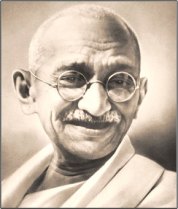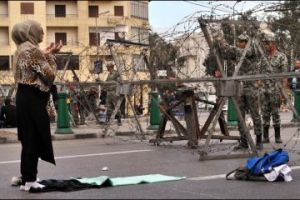This is an analysis (done from a Political Science perspective) of Nelson Mandela, Mahatma Gandhi, & Mohamed Morsi. The views are all personal.
An important aspect of each individuals’ vision, policies, and personal philosophies is INCLUSIVENESS, as opposed to exclusiveness, as well as the unwavering commitment to the holistic components of pluralist [secular] democracy (meaning, not just elections).
You be the judge …
Mandela & Gandhi – compared to Mohamed Morsi
Copyright Hayat Alvi 2013
|
|
Education |
Environment of Activism |
Jail Time & Symbolism |
Political Leadership |
Religious Leadership |
| Nelson Mandela | Earned B.A.; aspired for law degree, tried three times, but failed due to intense political activism throughout his youth (to fight against Apartheid) | Lived in Apartheid-era South Africa; joined political activists groups since his youth to fight against Apartheid;Apartheid-era South Africa (SA) was not a democracy: it was a brutally segregated rule of white minorities over an oppressed black majority, & a 3rd category of “coloreds” (mainly Indians);Mandela was a principal actor in facilitating SA’s post-Apartheid democratization
|
Brutally oppressive Apartheid regime imprisoned Mandela for 27 years; he became icon for the anti-Apartheid movement, central figure of the African National Congress (ANC), even while in prison | Mandela was elected South Africa’s first ever black President AFTER he was released from prison in the early 1990s; he served one term then retired into private life;Mandela has always promoted ethnic/racial unity, coexistence, & cooperation in post-Apartheid SAThis could not have happened without the Truth & Reconciliation Commission (forgiving the brutal crimes of the Apartheid police state)
|
Mandela has universal appeal and respect, regardless of religious and ethnic/racial identity; his activism has not involved religion, & only focused on ending the Apartheid regime & structure in SA; he has fought for unity & harmonious coexistence of all religions and ethnic/racial groups in post-Apartheid SA;ANC activism has involved people of all colors, genders, ethnicities, occupations, & religions, including Jews, Christians, Muslims, Hindus; in general, it’s a very inclusive framework |
|
|
Education |
Environment of Activism |
Jail Time & Symbolism |
Political Leadership |
Religious Leadership |
| Mahatma Gandhi | UK educated lawyer, practicing attorney | British colonial India: Gandhi was educated in the UK, lived in India, & his first major assignment as an attorney was in South Africa; he began nonviolent activism against Apartheid (late 1800s) in South Africa; then he returned to India & fought against British colonial rule in India; Gandhi & Congress Party leaders aspired to create a pluralist secular democracy in post-British India;Gandhi was a principal actor in facilitating India’s post-colonial democratization | British colonial power imprisoned Gandhi numerous times; he was always in & out of jail in India; his wife & personal secretary died while in “house arrest” (Pune); Gandhi spent several years in Yerwada Central Jail (Pune); Gandhi even taught inmates the art of nonviolent civil disobedience & noncooperation;*Watch the Ben Kingsley film “Gandhi” | Gandhi was a spiritual leader of India’s Congress Party, which led the fight against British colonial rule in India, but he never accepted or desired a higher political leadership role;He was a very shrewd strategist in politics, esp. against the British in India; but, he never held political office | Gandhi called himself every religious identity in India, & promoted human rights for Dalits (“Untouchables”), women, and minorities; he was a universalist, a peace activist, & embraced all religions; he studied all major Indian religions; & he promoted religious unity & harmony; his vision & policies were always inclusive;he was assassinated by a Hindu extremist after the Partition of Pakistan |
|
|
Education |
Environment of Activism |
Jail Time & Symbolism |
Political Leadership |
Religious Leadership |
| MohamedMorsi | B.A. & Masters in Engineering from Cairo University;Ph.D. in Materials Science from University of Southern California | Morsi has been an active Muslim Brotherhood (MB) member in Egypt during Hosni Mubarak’s presidency; Egypt has never seen true democracy, but the 2011 revolution changed this trend;Morsi served as member of Egypt’s parliament (2000-2005) as an independent candidate (since MB was banned); he became president of the Freedom & Justice Party (MB-affiliated political party) in 2011;MB openly challenged Hosni Mubarak’s autocratic rule when the group joined secular protestors in Tahrir Square in Jan.-Feb. 2011;
Mubarak was overthrown, SCAF held power until elections in June 2012
|
Mubarak regime jailed Morsi & other MB members on 28 January 2011, & then released 2 days later (30 Jan.), w/ varying accounts of a jailbreak from the Wadi el-Natroun Prison; after run-off election in June 2012, Morsi won presidency in Egypt’s first democratic elections;On June 30, 2013, a counter-Morsi gov’t protest movement took to Tahrir Square (after grievances against Morsi’s leadership);July 3, 2013 Gen. Abdel Fatah el-Sisi announced that Morsi has been removed as President (& detained in an undisclosed location), & installed an interim president;
Egypt is divided into a “pro-Morsi” (mainly MB) camp & pro-Sisi camp; The pro-Morsi protestors remain steadfast in opposing his ouster & detention & demand his return as President; violence has been reported in clashes between the pro- & anti-Morsi camps
|
Morsi served as Egypt’s first post-2011 revolution President; Morsi’s domestic policies & political leadership have been characterized by: A revised constitution that promotes Islamic law & penalizes “insults” (i.e., stifles expression); Morsi sought to free 1990s WTC bombing mastermind blind Sheikh Omar Abdel-Rahman; Morsi filled bureaucracies & the legislature w/ Islamists & purged secularists; he promised to appoint a woman & Christian as Vice Presidents, but never did; he annulled amendments that would’ve restricted presidential powers; he didn’t attend the new Coptic Pope’s enthronement;His policies increasingly resembled the Mubarak regime; his policies derailed democracy in Egypt; he marginalized many groups, & under his watch Shias were killed in Giza, & numerous violent attacks against Copts took place;Morsi’s policies have been politically exclusive | President of Freedom & Justice Party (MB-affiliated); Sunni Islamist;Morsi allegedly made comments that were anti-Jewish, anti-Israeli; attended rally where Salafi clerics called Asad supporters “infidels” & Morsi endorsed the sentiments; Morsi is drowning in scandals including the “Descendants of Apes & Pigs” controversy, allegedly calling Israelis “apes & pigs” – online video of this is available (later he qualified the statement by saying he was criticizing Israeli policy, not Jewish people);
He tried to reach out to Iran, but Salafist constituents in Egypt pressured against it, & fierce anti-Shia sentiments surfaced, w/ Giza massacre; Morsi has been exclusive in terms of gender, religious & sectarian identities in Egyptian politics & religious discourse
|
Final Note:
The Sisi regime is a dangerous direction (in my view) for Egypt’s future. If a pluralist (INCLUSIVE) secular democracy is not reinstated in Egypt ASAP, the Egyptian protestors who ushered in the unprecedented changes in 2011 will be back to square one. The struggle will have to start all over again.
Copyright Hayat Alvi 2013




